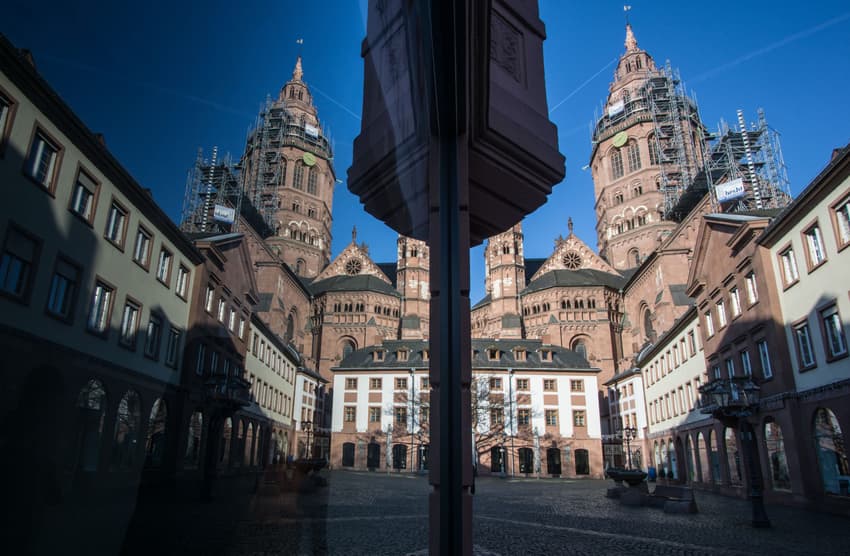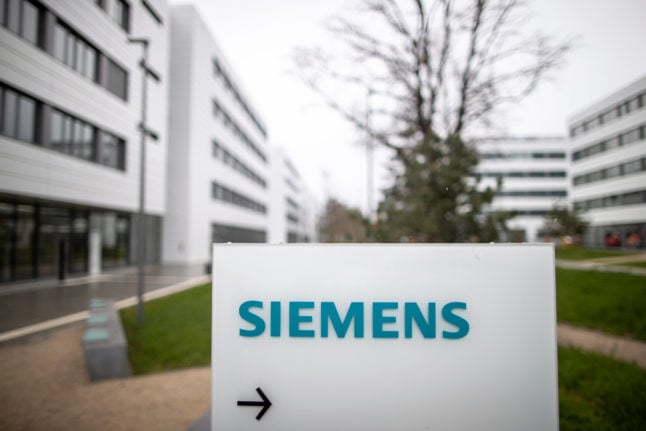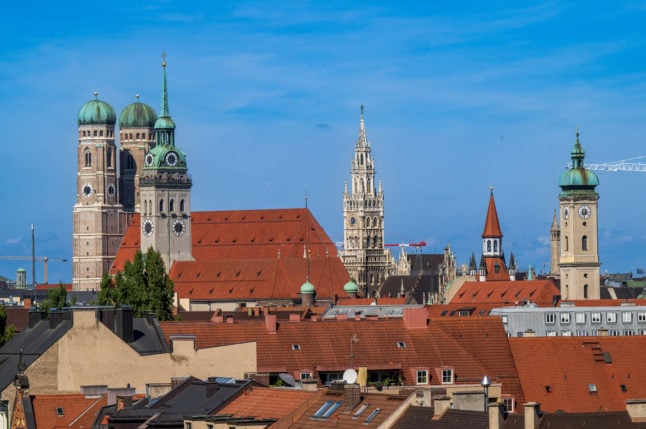REVEALED: The unlikely place crowned Germany's 'most dynamic city'

Forget Berlin, Frankfurt or Munich - a much less obvious contender has been crowned Germany's most dynamic city in 2022. Here's a rundown of the winners and losers in this year's rankings.
From the windy coastal north to the mountainous south, Germany is a country with an array of diverse landscape and cultures - and nowhere is this better reflected than in its cities.
Unlike countries like the UK where politics, media and business are largely centralised in the capital, Germany's cities tend to each have their own sources of pride. There's the political hubs of Berlin and Bonn, the banking capital of Frankfurt, and Munich with its bustling media and business culture.
With so many different metrics at play, it may be hard to pinpoint which city is the most successful - but a comprehensive study of the nation's largest towns has tried to do just that.
Compiled by IW Consult on behalf of real estate portal ImmoScout24, the City Ranking 2022 pitted 71 German cities with a population of 100,000 of more against each other. Each of the cities earned scores in more than 100 areas, from financial strength and productivity to education level, density of daycare centres and demographics.
The individual results were incorporated into three major rankings. Firstly, the level ranking, which is based on the most recent actual values. Secondly, the dynamics ranking, which analyses changes in municipal performance over a five-year period. And thirdly, the sustainability ranking, which examines the future viability of cities on the basis of 22 ecological, economic and social factors.
READ ALSO: Working in Germany: Which sectors currently have the most job openings?
Mainz is Germany's 'most dynamic city'
According to the survey, the city of Mainz currently tops the scoreboard as the most dynamic city in the country.
While the western Germany city achieved middling scores for criteria like quality of life and housing, recent economic successes played a decisive role.
Most notably, Mainz-based vaccines manufacturer BioNTech saw a huge spike in revenue during the pandemic after developing one of the first mRNA Covid vaccines. This has meant that the company currently pays significantly more in the business taxes in the area, transforming the city's economic outlook.
READ ALSO: Travel in Germany: Six reasons why Mainz is worth visiting
"Mainz jumps from 48th to first place due to the significantly increased municipal tax power," Hanno Kempermann of IW Consult.
The Rhineland-Palatinate capital has recognised this unique opportunity and is planning numerous projects in the areas of climate protection and mobility, sport and leisure, as well as youth and culture, Kempermann added.
With its stellar rise to first place, Mainz managed to topple the Germany capital, which landed in second place in the rankings.
Berlin's burgeoning tech and start-up sector had seen it take the top spot as Germany's most dynamic city in recent years, though the capital continues to rank lower than other German metropoles in terms of its economic power and quality of life.
Berlin did, however, score by far the highest on one key ranking: the amount of demand for housing in the area.
Other high-achievers in the dynamism ranking include the Bavarian town of Erlangen, which landed in third place, the city of Leipzig in Saxony.

The Siemens logo outside the Siemens campus in Erlangen. Photo: picture alliance/dpa | Daniel Karmann
According to IW Consult, this unassuming town just north of Nuremberg is exceptional in more ways than one: it has one of the lowest crime rates and school dropout rates of the German cities, it has more jobs than residents, and more than one in three employees has a university degree.
Combined with the presence of major employers like Siemens, Adidas and Puma in the city, as well as the highly regarded Erlangen-Nuremburg University, these factors saw Erlangen places at the top of the 'economy' category.
READ ALSO: REVEALED: The German university towns where property prices are going up (and down)
In contrast, the eastern German city of Leipzig came halfway down the scoreboard in 36th place on the economy ranking. However, the city that has recently been branded "Hypezig" due to its appeal to young people came in third place for quality of life and second when it came to work opportunities.
As newcomers, Halle (Saale), Leverkusen, Oldenburg and Darmstadt all made it into the top ten of the dynamic ranking for the first time - displacing Heilbronn, Lübeck, Kiel, Munich and Potsdam.
The city of Halle in Saxony-Anhalt came top for job prospects, while Leverkusen topped the housing charts and Oldenburg was named the city with the best quality of life.
On the other end of the spectrum, Trier scored worst for jobs, Ludwigshafen scored worst on economy, Chemnitz was worst for housing and Kaiserslautern offered the least good quality of life.
Current and future powerhouses
Munich continues to hold its own at the top of the so-called level ranking, which analyses the current economic strength of the independent cities with more than 100,000 inhabitants.
Though the Bavarian capital has seen its housing market hit by rising interest rates in recent months, it remains one of Germany's primary economic powerhouses.
As in 2021, Erlangen also appears high up in the rankings in second place. The Franconian city is the only major city in Germany to make it into the top five in each of the level, dynamism and sustainability rankings.
Stuttgart, Ingolstadt and Frankfurt also reappeared in the top five in terms of economic strength, while Mainz made it into the top ten in place nine.
READ ALSO: Three German cities ranked in the top 10 best places to live

The skyline of Munich, which topped the rankings for economic power in 2022. Photo: picture alliance/dpa | Peter Kneffel
"Experience shows that cities that do well in the dynamics ranking also move up in the level ranking with a slight time lag," said Gesa Crockford, managing director of Immoscout24.
On the flip-side, the metropolises of Cologne and Berlin continued to slip in the so-called level ranking. Cologne dropped three down from 27th to 30th place and Berlin slipped from 41st to 42nd place. According to IW Consult, the high level of sick leave in the public sector in both cities was one of the most striking features noted by researchers.
"Cologne and Berlin are united above all by the partly dysfunctional city administration, which is reflected among other things in the conspicuously high level of sick leave in the civil service," they said.
When it comes to sustainability, Wolfsburg defended its place at the top of the index, which looks at economic, ecological and social factors to determine future prospects.
The fact that the city is home to Volkswagen was a key factor in its placement at the top of the economic sustainability ranking.
However, the university town of Ulm - which landed in second place - scored the highest for its ecological and social credentials.
Comments
See Also
From the windy coastal north to the mountainous south, Germany is a country with an array of diverse landscape and cultures - and nowhere is this better reflected than in its cities.
Unlike countries like the UK where politics, media and business are largely centralised in the capital, Germany's cities tend to each have their own sources of pride. There's the political hubs of Berlin and Bonn, the banking capital of Frankfurt, and Munich with its bustling media and business culture.
With so many different metrics at play, it may be hard to pinpoint which city is the most successful - but a comprehensive study of the nation's largest towns has tried to do just that.
Compiled by IW Consult on behalf of real estate portal ImmoScout24, the City Ranking 2022 pitted 71 German cities with a population of 100,000 of more against each other. Each of the cities earned scores in more than 100 areas, from financial strength and productivity to education level, density of daycare centres and demographics.
The individual results were incorporated into three major rankings. Firstly, the level ranking, which is based on the most recent actual values. Secondly, the dynamics ranking, which analyses changes in municipal performance over a five-year period. And thirdly, the sustainability ranking, which examines the future viability of cities on the basis of 22 ecological, economic and social factors.
READ ALSO: Working in Germany: Which sectors currently have the most job openings?
Mainz is Germany's 'most dynamic city'
According to the survey, the city of Mainz currently tops the scoreboard as the most dynamic city in the country.
While the western Germany city achieved middling scores for criteria like quality of life and housing, recent economic successes played a decisive role.
Most notably, Mainz-based vaccines manufacturer BioNTech saw a huge spike in revenue during the pandemic after developing one of the first mRNA Covid vaccines. This has meant that the company currently pays significantly more in the business taxes in the area, transforming the city's economic outlook.
READ ALSO: Travel in Germany: Six reasons why Mainz is worth visiting
"Mainz jumps from 48th to first place due to the significantly increased municipal tax power," Hanno Kempermann of IW Consult.
The Rhineland-Palatinate capital has recognised this unique opportunity and is planning numerous projects in the areas of climate protection and mobility, sport and leisure, as well as youth and culture, Kempermann added.
With its stellar rise to first place, Mainz managed to topple the Germany capital, which landed in second place in the rankings.
Berlin's burgeoning tech and start-up sector had seen it take the top spot as Germany's most dynamic city in recent years, though the capital continues to rank lower than other German metropoles in terms of its economic power and quality of life.
Berlin did, however, score by far the highest on one key ranking: the amount of demand for housing in the area.
Other high-achievers in the dynamism ranking include the Bavarian town of Erlangen, which landed in third place, the city of Leipzig in Saxony.

According to IW Consult, this unassuming town just north of Nuremberg is exceptional in more ways than one: it has one of the lowest crime rates and school dropout rates of the German cities, it has more jobs than residents, and more than one in three employees has a university degree.
Combined with the presence of major employers like Siemens, Adidas and Puma in the city, as well as the highly regarded Erlangen-Nuremburg University, these factors saw Erlangen places at the top of the 'economy' category.
READ ALSO: REVEALED: The German university towns where property prices are going up (and down)
In contrast, the eastern German city of Leipzig came halfway down the scoreboard in 36th place on the economy ranking. However, the city that has recently been branded "Hypezig" due to its appeal to young people came in third place for quality of life and second when it came to work opportunities.
As newcomers, Halle (Saale), Leverkusen, Oldenburg and Darmstadt all made it into the top ten of the dynamic ranking for the first time - displacing Heilbronn, Lübeck, Kiel, Munich and Potsdam.
The city of Halle in Saxony-Anhalt came top for job prospects, while Leverkusen topped the housing charts and Oldenburg was named the city with the best quality of life.
On the other end of the spectrum, Trier scored worst for jobs, Ludwigshafen scored worst on economy, Chemnitz was worst for housing and Kaiserslautern offered the least good quality of life.
Current and future powerhouses
Munich continues to hold its own at the top of the so-called level ranking, which analyses the current economic strength of the independent cities with more than 100,000 inhabitants.
Though the Bavarian capital has seen its housing market hit by rising interest rates in recent months, it remains one of Germany's primary economic powerhouses.
As in 2021, Erlangen also appears high up in the rankings in second place. The Franconian city is the only major city in Germany to make it into the top five in each of the level, dynamism and sustainability rankings.
Stuttgart, Ingolstadt and Frankfurt also reappeared in the top five in terms of economic strength, while Mainz made it into the top ten in place nine.
READ ALSO: Three German cities ranked in the top 10 best places to live

"Experience shows that cities that do well in the dynamics ranking also move up in the level ranking with a slight time lag," said Gesa Crockford, managing director of Immoscout24.
On the flip-side, the metropolises of Cologne and Berlin continued to slip in the so-called level ranking. Cologne dropped three down from 27th to 30th place and Berlin slipped from 41st to 42nd place. According to IW Consult, the high level of sick leave in the public sector in both cities was one of the most striking features noted by researchers.
"Cologne and Berlin are united above all by the partly dysfunctional city administration, which is reflected among other things in the conspicuously high level of sick leave in the civil service," they said.
When it comes to sustainability, Wolfsburg defended its place at the top of the index, which looks at economic, ecological and social factors to determine future prospects.
The fact that the city is home to Volkswagen was a key factor in its placement at the top of the economic sustainability ranking.
However, the university town of Ulm - which landed in second place - scored the highest for its ecological and social credentials.
Join the conversation in our comments section below. Share your own views and experience and if you have a question or suggestion for our journalists then email us at [email protected].
Please keep comments civil, constructive and on topic – and make sure to read our terms of use before getting involved.
Please log in here to leave a comment.